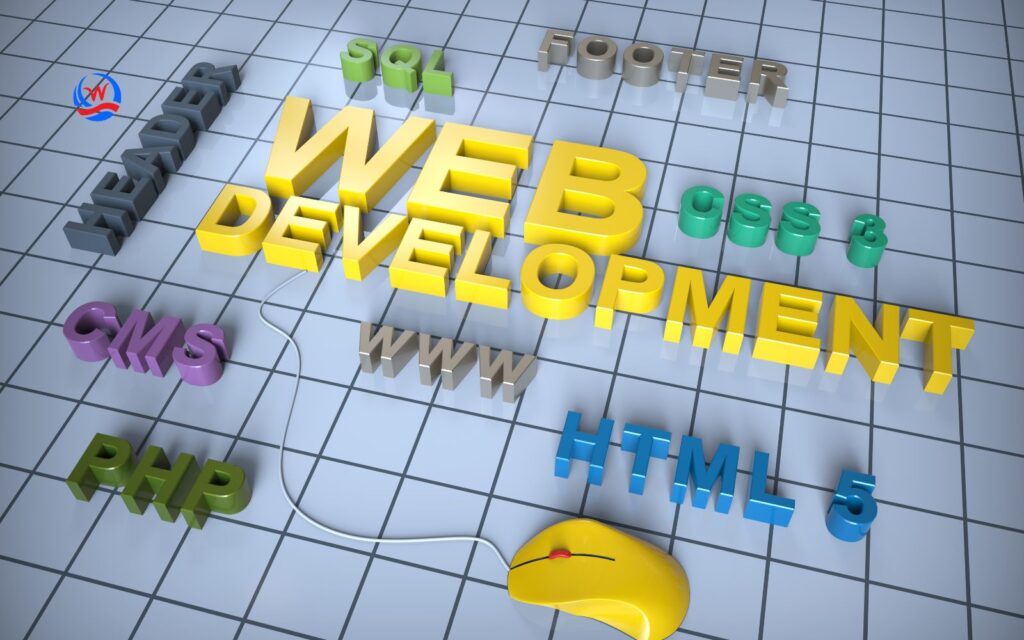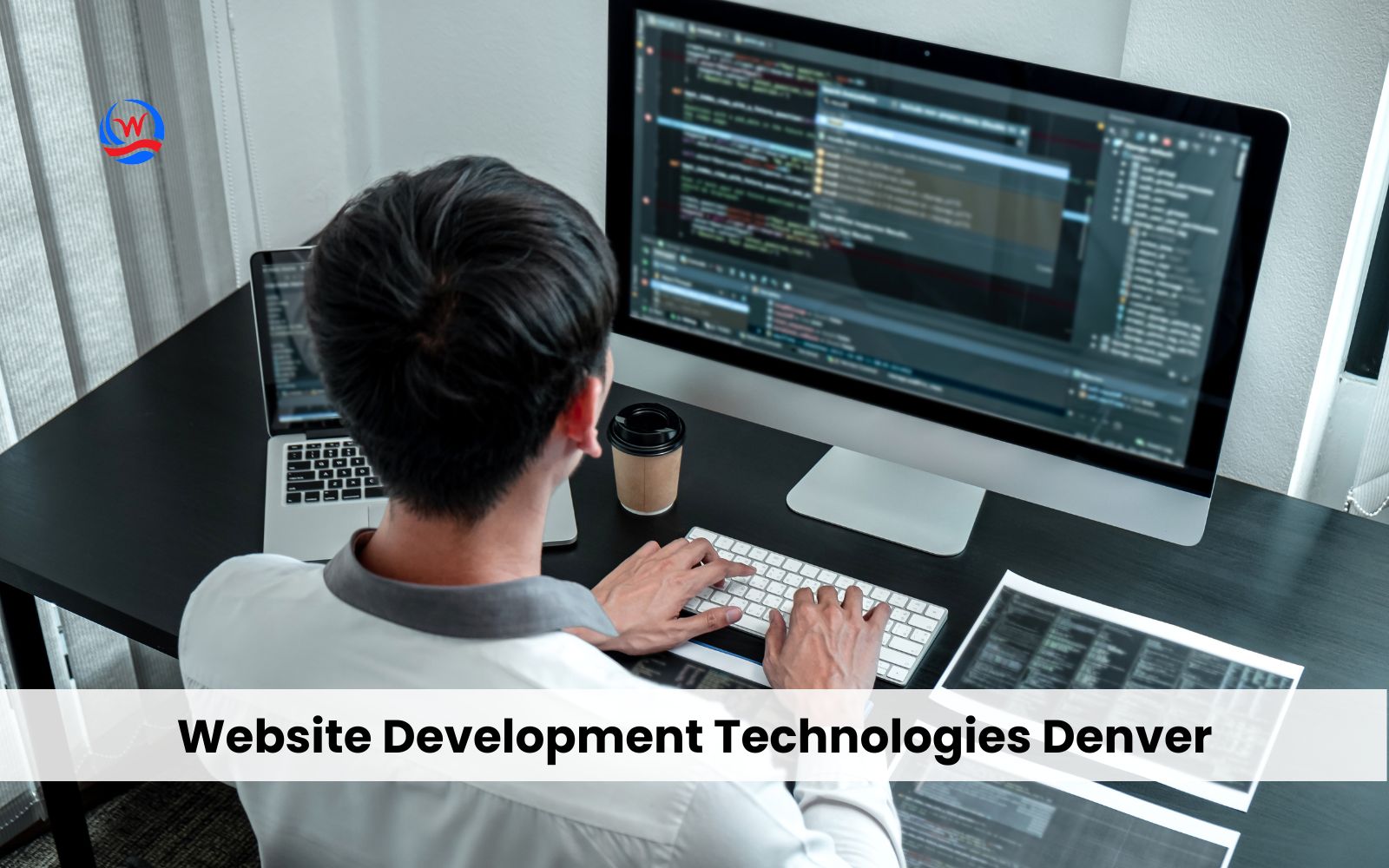For business owners across the Mile High City, selecting the appropriate website technologies presents a significant challenge. The overwhelming array of options, technical jargon, and the critical balance between cost and functionality can make technology decisions feel like navigating through a digital maze without a map.
This comprehensive guide cuts through the complexity of website development technologies Denver to help businesses make informed technology decisions that align with their goals, budget, and growth plans.
Whether you’re launching a Denver startup, running a small business looking to modernize your web presence, this guide provides the roadmap you need to navigate the website development technologies Denver businesses rely on for success.
What Are Website Development Technologies?
Website development technologies are the building blocks and tools that create and power your business’s digital presence.
Think of them as the construction materials and techniques used to build your online storefront or digital headquarters. Just as a physical store needs the right foundation, framework, and fixtures to function, your website requires appropriate technologies to deliver the experience your customers expect.
These technologies fall into several core components that work together to create a complete website. Think of your website like a car:
- The front-end is what users see and interact with (like the dashboard and controls)
- The back-end is the engine that powers everything, databases store all your important information (like the fuel tank)
- Frameworks provide the chassis that holds everything together in the right structure.

Why Technology Choices Matter for Denver Businesses
The technologies powering your website directly impact its performance, which in turn affects user experience and conversion rates.
In Denver’s competitive business landscape, where consumers expect digital experiences that match the city’s tech-forward reputation, the wrong technology choices can put your business at a significant disadvantage.
For example, websites that load slowly due to outdated technologies see abandonment rates as high as 53%, according to recent studies of Denver consumer behavior.
Key business outcomes influenced by technology choices include:
- Customer engagement and retention rates
- Operational efficiency and resource allocation
- Competitive advantage in your market segment
- Marketing effectiveness and conversion potential
Popular Web Development Technologies Denver
Front-End Technologies
Denver’s tech ecosystem has embraced modern front-end technologies that deliver responsive, interactive user experiences.
| Technology | Best For | Denver Adoption | Learning Curve | Cost Implications |
| React.js | Dynamic, interactive interfaces | High among startups | Moderate-High | Higher initial development |
| Angular | Enterprise applications | Common in larger companies | Steep | Higher initial, lower maintenance |
| Vue.js | Smaller projects, startups | Growing rapidly | Moderate | Balanced approach |
The city’s web development community shows a strong preference for JavaScript frameworks that enable dynamic interfaces with minimal loading times – a critical factor for retaining user attention.
For personalized guidance on selecting the right front-end technology for your specific business needs, call us at (720) 334-0899.
Back-End Technologies
Back-end technologies handle everything your customers don’t see but rely on – data processing, security protocols, and integration with your business systems.
Think of them as the engine room of your website, where the real work happens behind the scenes to deliver the functionality your business requires.
Denver developers show strong preference for versatile back-end solutions that balance performance with cost-effectiveness.
Node.js has gained significant traction among Denver startups for its speed and scalability, while established enterprises often favor .NET and Java for their robust security features and enterprise integration capabilities.

Content Management Systems for Denver Businesses
Content management systems (CMS) determine how easily your team can update content, manage products, and control your digital presence without developer intervention – a critical consideration for operational efficiency.
WordPress continues to dominate the Denver market, powering approximately 65% of small business websites across the city. Its widespread adoption means abundant local support options and a wealth of developers familiar with customization approaches.
For businesses requiring regular content updates, blog management, or simple e-commerce capabilities, WordPress development Denver companies offer an accessible entry point with room to grow.
Different CMS options make sense in specific business scenarios:
- WordPress: Content-heavy sites with regular updates and standard functionality
- Headless CMS: Omnichannel content distribution and unique presentation requirements
- Custom CMS: Unique business workflows and specialized operational requirements
Not sure which CMS is right for your specific business model? Email [email protected] for a free assessment of your content management needs.
Choosing the Right Technology Stack for Your Denver Business
Small Business Website Technology Considerations
Budget considerations naturally top the list of concerns for Denver’s small business owners.
Fortunately, website development technologies Denver small businesses can afford have expanded significantly, with several approaches offering excellent value without compromising quality.
Most small businesses should focus on technologies that minimize maintenance requirements while providing maximum flexibility for future growth.
Local Denver support availability should also factor heavily in your decision, as timely assistance can prevent costly downtime.
| Solution Type | Initial Investment | Ongoing Costs | Denver Provider Options |
| DIY Website Builder | $0-30/month | $20-50/month | Self-service with local support available |
| WordPress + Theme | $1,000-3,000 | $50-200/month | Numerous Denver agencies |
| Custom Development | $5,000-25,000+ | $100-500/month | Boutique and enterprise Denver firms |
Startup Technology Stack Recommendations
Successful Denver startups typically balance innovation with reliability in their technology selections. While cutting-edge technologies can deliver competitive advantages, they also introduce risks that can distract from business development.
The most successful approach often involves proven core technologies supplemented by strategic innovation in areas directly tied to your competitive advantage.
Consider Denver-based meal delivery startup FreshFare, which selected a React front-end with a Node.js back-end for their initial platform.
This technology stack supported their growth from 50 to 5,000 daily orders without requiring a complete rebuild, saving an estimated $200,000 in development costs and preventing service disruptions that could have damaged their brand during a critical growth phase.
Mobile and Responsive Technologies
Mobile-First Development Approaches
Mobile devices account for 67% of all web traffic to Denver business websites, according to recent analytics data. This statistic alone highlights why mobile optimization must be a priority for any business developing a new website or upgrading an existing one.
Mobile-first development approaches begin with designing for the smallest screens and gradually enhancing the experience for larger devices.
This technique, known as progressive enhancement, ensures that your core business functionality works across all devices rather than being compromised on mobile. Comprehensive testing across multiple devices and browsers is essential for ensuring consistent user experiences.
Responsive Design Technologies
Responsive design refers to creating sites that automatically adapt to different screen sizes and devices rather than creating separate websites for mobile and desktop users.
The most efficient responsive design approaches utilize modern CSS frameworks that handle the technical complexities of adaptation. For business owners, the advantage is maintenance efficiency – you update content once rather than managing multiple versions of your website.

Progressive Web Apps for Denver Businesses
Progressive Web Apps (PWAs) deliver app-like experiences through the web browser, including offline functionality, push notifications, and home screen installation.
PWAs make particularly good business sense for companies with high repeat visitor rates, such as service businesses with regular client interactions or retailers with frequent purchasers.
The ability to function offline and provide app-like experiences without the friction of app store downloads creates significant competitive advantages.
Denver outdoor retailer MountainGear implemented PWA technology in late 2024, resulting in a 32% increase in mobile conversions and a 27% improvement in average session duration.
The technology allowed customers to browse products even with spotty cellular connections – a significant advantage for their target market of outdoor enthusiasts.
Website Optimization Technologies
Performance Optimization Tools and Techniques
Core Web Vitals represent Google’s metrics for evaluating website performance from a user perspective. Modern performance optimization approaches leverage advanced compression, caching, and delivery techniques to improve load times.
These technologies can transform a sluggish 5-second load time to under 2 seconds – the threshold at which abandonment rates significantly decrease.
Key performance metrics Denver businesses should monitor include:
- Page load time (under 2 seconds is ideal)
- Time to interactive (when users can actually engage)
- Layout stability (preventing annoying shifting elements)
- Server response time (how quickly your site begins loading)
SEO Technology
Technical SEO requirements extend far beyond content optimization to include structural elements that significantly impact search visibility.
Schema markup and structured data technologies help search engines understand the context of your content, enabling rich results that stand out in search listings. For Denver businesses targeting local customers, local business schema provides critical signals that boost visibility in geographically relevant searches.
Denver businesses should pay particular attention to technologies that support neighborhood-level SEO optimization. With Denver’s distinct neighborhoods like LoDo, RiNo, and Cherry Creek each having their own search patterns, granular location optimization delivers measurable advantages in competitive markets.
Website Security Technologies
Website security is important because security breaches can result in direct financial losses, regulatory penalties, and devastating reputational damage that persists long after technical issues are resolved.
SSL implementation is no longer optional for legitimate businesses, with Google Chrome and other browsers flagging non-HTTPS websites as “not secure.” Beyond the technical implementation, the visual security indicators provided by SSL certificates significantly impact customer trust and willingness to share information or complete purchases.
Denver businesses in regulated industries face additional security considerations based on local and state requirements.
Healthcare providers must implement HIPAA-compliant technologies, financial services companies need systems that satisfy banking regulations, and any business collecting personal information must comply with Colorado’s consumer data protection laws.

Denver Web Development Resources
Finding the Right Development Partner
Denver’s web development landscape includes agencies ranging from solo freelancers to enterprise-level firms, each with distinct specializations and service models.
The right partner for your business depends not just on technical capabilities but on alignment with your communication preferences, budget constraints, and business culture.
Beyond technical skills, evaluate potential partners on their business acumen and understanding of your industry. A developer who comprehends your business model will deliver more valuable solutions than one with superior technical skills but limited business context.
When evaluating Denver web developers, ask these critical questions:
- Can you share examples of similar businesses you’ve worked with?
- Which technology stack do you recommend for our specific needs and why?
- What is your approach to support and maintenance after launch?
- How do you manage projects and communicate progress?
- Can we speak with references from local clients with similar projects?
Denver Tech Community and Events
Organizations like Denver Startup Week, Colorado Technology Association, and numerous meetup groups provide opportunities to learn about emerging technologies and connect with experts in an educational setting.
Key events where Denver business owners can gain insights include Denver Digital Summit, WordCamp Denver, and Boulder/Denver Tech Meetup. These gatherings offer practical knowledge without sales pressure, helping business owners build the understanding needed to make informed technology choices.
Engaging with the local tech community provides access to collective wisdom that can prevent costly mistakes. Even occasional participation can significantly improve your ability to evaluate technology options and development partners from an informed perspective.
Cost Considerations for Denver Businesses
Denver web development providers use one of three pricing models: fixed project fees, hourly rates, or retainer arrangements.
Each model affects both initial costs and your ability to manage ongoing expenses, making it essential to understand the implications before committing.
Ongoing maintenance expenses often surprise business owners who focus exclusively on initial development costs. Plan for regular updates, security patches, and occasional feature enhancements, typically ranging from 15-25% of the initial development cost annually.
Frequently Asked Questions (FAQs)
What’s the best CMS for Denver startups?
For most Denver startups, WordPress offers the ideal balance of flexibility, cost-effectiveness, and local support availability. For startups with unique content distribution needs, headless CMS solutions might be more appropriate.
Should I invest in custom development or a WordPress site?
This depends on your specific business requirements. WordPress is sufficient for about 70% of business websites, while custom development makes sense when you have unique processes or integration needs.
How much does a basic vs. advanced website typically cost in Denver?
In Denver, basic websites using templates or simple WordPress builds typically range from $1,500-5,000. Advanced websites with custom functionality, e-commerce capabilities, or complex integrations generally start at $8,000 and can exceed $25,000 depending on specific requirements and features needed.
How The Ocean Wide Helps Denver Business
At The Ocean Wide, we specialize in creating customized technology stack recommendations based on your specific business goals.
Rather than pushing one-size-fits-all solutions, we analyze your requirements, constraints, and growth plans to identify the most appropriate technologies for your unique situation.
Every website we develop incorporates mobile optimization, speed performance, robust security, and SEO integration as standard features rather than expensive add-ons. We believe these elements are essential to business success, not optional extras.
Ready to discuss your website development needs?
Schedule a free consultation by calling (720) 334-0899 or emailing [email protected]. We’ll help map your project requirements and identify the right technology approach for your Denver business.
Conclusion
Selecting the right website development technologies Denver businesses need requires balancing technical considerations with business priorities. The most successful approaches focus first on business objectives, then identify technologies that support those goals, rather than starting with technology preferences.
Remember that technology decisions have long-term implications for your business operations, marketing effectiveness, and customer experience. Taking time to understand the options and their business implications will pay dividends throughout the life of your website.
To apply what you’ve learned in this guide, start by clearly defining your business requirements and constraints, then evaluate technology options against those specific needs rather than general trends or recommendations.
Consider seeking expert guidance for this evaluation process to ensure all relevant factors are considered.
